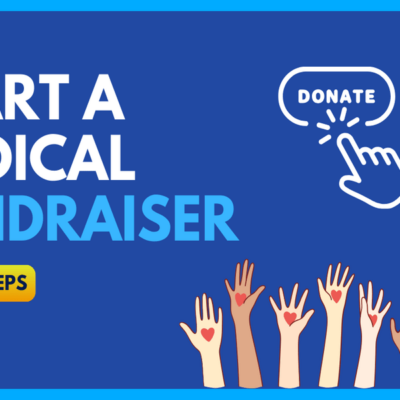Starting a Fundraiser? How to Ask for Donations in 4 Easy Steps
Starting a Fundraiser? How to Ask for Donations in 4 Easy Steps
You have heard about fundraisers and may be looking to start one. What exactly is it, and how does it work? Fundraising involves receiving donations from family and friends for an important cause.
You might imagine the classic lemonade stand selling cold drinks or car washes with giant yellow sponges as a fundraiser. There are new ways to ask for donations for personal crowdfunding, and in this post, you’ll learn about the five best ways to ask.
- Individually Crowdfunding and Why Stories Matter
Telling your story can help establish trust and set you up for reaching your goals if you’re authentic. Motivation to help is often rooted in spreading inspiration. Your story must be honest and clearly understood.
When you open up about the situation and explain how the donations will be used, people are more likely to donate to your personal crowdfunding campaign. Your story should cover specific details, such as why you need assistance and what the money will be used for.
If you need funds for treatment, you could explain your health situation and how many treatments you need. Giving details about how the treatments will help will reassure donors that their money is making someone’s life better.
One of the worst things you can do when reaching out is using a copy-and-paste message. Have you ever opened an email so obviously copied and pasted that it was insulting? It would be best if you thought about what you are saying and asking of the person. Try to appeal to their interest or their view of the world.
If the person you are talking to is someone you are familiar with, then try reminiscing with a good member or include their pet. You could say something like, “and that’s why we are seeing if you and Scruffy can help.” This is an example of how you may appeal to a pet lover. Of course, if you’re reaching out to someone you work with or even a business, you’d want to make the outreach more formal.
- Social Media and Emails for Individual Crowdfunding
Speaking of copied and pasted emails, consider using emails to reach donors. While social media is one of the best ways to leverage donations, emails can appeal to those off platforms like Instagram or Facebook. If you use an email template, change a few elements to make it personal and use their name.
No one reads an email that says Dear Sir/Ma’am. You want to use all available options to get your individual crowdfunding to succeed. To ensure your emails appeal to the recipient, include actionable steps clearly and concisely. People are moved to help if they think what they do will make a difference.
Explain how every dollar counts and that they will help. You want them to take action, not only sympathize with you. You can even say, “Your $5 donation could add to the $995 total, which would help us meet the goal of $1,000.”
After they receive the email, you can follow up in a few days to see if they would share your personal crowdfunding page with a few people. Remember to say thank you at the end of the emails because they used their time to read it! It’s a small way to show appreciation and encourage donations.
While emails are excellent for the few friends and family who don’t use social media, you should prioritize social media for your personal crowdfunding. Another excellent way to get a faster response would be to text close friends and family directly.
- Get Creative With Personal Crowdfunding
Individual crowdfunding is an excellent time to get creative with your message. You want to evoke feelings and a connection with donors. There are several ways you can get creative with it.
You can send pictures or videos or advertise a raffle for the donors. It can even be handmade or an item within your budget, but it’s a fun way to encourage donations. Other ways you can get creative with personal crowdfunding are:
- Creating a funny short story or even a true story about yourself.
- Writing a silly poem.
- Use popular songs as inspiration for writing your introduction.
- Incorporate famous quotes at the beginning of your messages.
- Brainstorm slogans for your personal crowdfunding.
- Include facts about the cause. For example, if it’s heart disease-related, define heart disease.
- Mention a celebrity with the condition (If your personal crowdfunding is related to medical costs). For example, you could include an opening like “Bill Clinton has heart disease, but I don’t have his kind of money, and that’s where you come in.” That may not be useful in formal situations but it could crack up a few family members.
- Don’t Forget To Show Urgency When You Start Personal Crowdfunding
It’s no secret that when products go on sale or are “limited time,” it urges you to buy them now. This holds true with individual crowdfunding, too. If your message doesn’t have a deadline or milestones planned, it can make donors put off donations. It’s like the “limited time” advertisements because they will act if they feel a sense of urgency.
If they think they can put off donating, then they will. You would be less likely to buy discounted shoes if the discount went on for months. While you don’t want to paint a morbid outcome if you don’t meet your goals, you should still express the consequences of not meeting them in a positive way.
Take a technique from copywriters. When wrapping up your message, include a clear CTA that is friction-free. A CTA is a Call To Action that describes something the writer wants the reader to do, like share their post or click the link.
After creating a sense of urgency, you must ensure your CTA leads to the personal crowdfunding page. You don’t want the recipient to have to try to Google your page or search through social media. Every message related to the cause should include a link to the fundraising page.
Why Asking For Help Is Hard and Why It Shouldn’t Be
It can be hard to ask for help for several reasons. One common reason is that some people feel like they bother others when asking for help. That isn’t the case most of the time. People are amazing, and it turns out that most people are happy to help. Some are hardwired to lean on their independence, which is respectable but is an even larger motivator to receive help from others. Whatever the reason is that you or someone you love doesn’t want to ask for help, remember one valuable thing: people are most likely to give.






